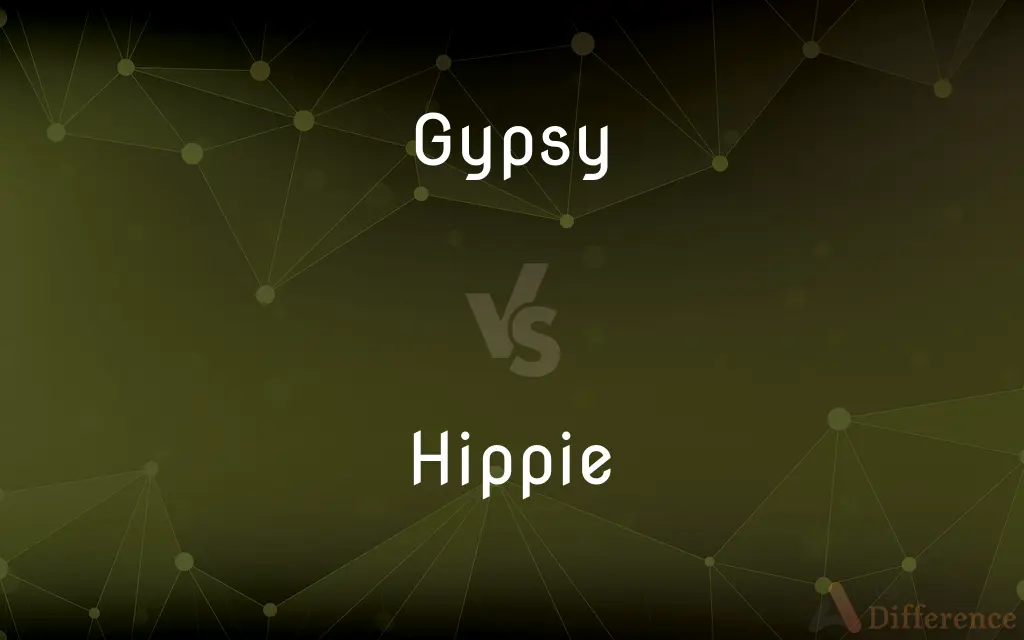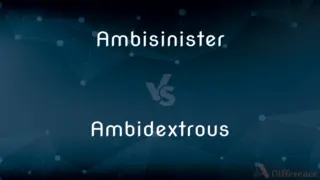Gypsy vs. Hippie — What's the Difference?
Edited by Tayyaba Rehman — By Fiza Rafique — Updated on September 30, 2023
Gypsy refers to an ethnic group with roots in South Asia, while Hippie denotes a subculture from the 1960s focused on peace and countercultural values.

Difference Between Gypsy and Hippie
Table of Contents
ADVERTISEMENT
Key Differences
Gypsies are historically a nomadic ethnic group, believed to have originated from the northern regions of the Indian subcontinent. Their migration took them to various parts of Europe and other continents. Hippies, on the other hand, emerged as a countercultural movement in the 1960s primarily in the U.S. and spread globally. Their ideology was rooted in peace, love, and freedom.
The term Gypsy, often considered pejorative, is associated with the Romani people, who have their distinct languages, customs, and traditions. In contrast, Hippies were not bound by ethnicity but by shared beliefs, including opposition to the Vietnam War, embrace of alternative lifestyles, and an affinity for psychedelic music and drugs.
Gypsies have faced discrimination and persecution for centuries, being misunderstood and stereotyped in various societies. Hippies, while criticized and sometimes mocked, were mainly a challenge to the mainstream culture of their time and a call for societal change.
Gypsies have a diverse set of traditions, rituals, and celebrations tied to their unique heritage. They have also contributed to the arts, especially music in the countries they've settled in. Hippies influenced fashion, music, literature, and even political thought with their bohemian lifestyle and emphasis on love and peace.
Comparison Chart
Origin
Northern regions of the Indian subcontinent
1960s America
ADVERTISEMENT
Nature
Ethnic Group
Subculture/Movement
Main Associations
Nomadism, Romani people, traditions
Peace, love, freedom, counterculture
Language
Romani and its dialects
English and other local languages, with countercultural slang
Lifestyle
Traditionally nomadic
Often communal and anti-establishment
Compare with Definitions
Gypsy
A member of the Romani people, known for their nomadic lifestyle.
The Gypsy community celebrated their traditional festival with music and dance.
Hippie
Someone who rejects mainstream societal values.
He lived like a Hippie, questioning everything and seeking deeper meaning.
Gypsy
Someone skilled in fortune-telling, often associated with Romani traditions.
She visited a Gypsy to have her palm read.
Hippie
A proponent of communal living and harmony with nature.
The Hippie community lived off-grid and grew their food.
Gypsy
A lifestyle or trait emphasizing freedom and wandering.
His Gypsy spirit took him to many far-off places.
Hippie
Related to the countercultural movement of the 1960s and 1970s.
She wore Hippie beads and tie-dye shirts.
Gypsy
A person with a wandering lifestyle and no fixed home.
He lived like a Gypsy, moving from town to town.
Hippie
A person associated with a subculture advocating for peace, love, and alternative lifestyles.
The Hippie protested the war and preached love.
Gypsy
Related to the culture, language, or traditions of the Romani people.
She wore a Gypsy skirt to the festival.
Hippie
Someone known for embracing psychedelic music and drugs.
The Hippie festival was filled with colorful art and psychedelic rock.
Gypsy
See Romani.
Hippie
A hippie, also spelled as hippy, is a member of the counterculture of the 1960s, originally a youth movement that began in the United States during the mid-1960s and spread to other countries around the world. The word hippie came from hipster and was used to describe beatniks who moved into New York City's Greenwich Village, San Francisco's Haight-Ashbury district, and Chicago's Old Town community.
Gypsy
The Romani language.
Hippie
A member of a counterculture originating in the United States in the 1960s, typically characterized by unconventional dress and behavior, communal or transient lifestyles, opposition to war, and liberal attitudes toward sexuality and the use of marijuana and psychedelic drugs.
Gypsy
A member of any of various traditionally itinerant groups unrelated to the Romani.
Hippie
(1950s slang) A teenager who imitated the beatniks.
Gypsy
A part-time or temporary member of a college faculty.
Hippie
(1960s slang; still widely used in reference to that era) One who chooses not to conform to prevailing social norms: especially one who subscribes to values or actions such as acceptance or self-practice of recreational drug use, liberal or radical sexual mores, advocacy of communal living, strong pacifism or anti-war sentiment, etc.
Gypsy
A member of the chorus line in a theater production.
Hippie
(modern slang) A person who keeps an unkempt or sloppy appearance and has unusually long hair (for males), and is thus often stereotyped as a deadbeat.
Gypsy
Alternative form of Gypsy: a member of the Romani people.
Hippie
Someone who dresses in a hippie style.
Gypsy
(colloquial) An itinerant person or any person, not necessarily Romani; a tinker, a traveller or a carny.
Hippie
One who is hip.
Gypsy
A move in contra dancing in which two dancers walk in a circle around each other while maintaining eye contact (but not touching as in a swing). whole gyp, half gyp, and gypsy meltdown, in which this step precedes a swing.}}
Hippie
Of or pertaining to hippies.
That dress looks very hippie.
Gypsy
(theater) A member of a Broadway musical chorus line.
Hippie
Not conforming to generally accepted standards.
They used a bunch of hippie compression formats instead of the usual RAR and ZIP.
Gypsy
(dated) A person with a dark complexion.
Hippie
Someone who rejects the established culture, dresses casually, and advocates extreme liberalism in politics and lifestyle. Used especially of those in the late 1960's, mostly in their late teens and early twenties, who conspicuously rejected traditional culture by dressing casually, if male wore their hair long, and wore folksy or used clothing adorned with beads, headbands, and often flowers; they emphasized the importance of love and direct personal relations rather than success-oriented businesslike behavior, strove for spontaneity, sometimes lived communally, and in some cases tried to expand their consciousness by various psychological techniques such as meditation, or through the use of consciousness-altering drugs such as marijuana or LSD. By the end of the Vietnam war in the 1970's, the numbers of people living a visibly hippie lifestyle had dramatically decreased, though some people continue to develop similar views and live with the same outlook.
Gypsy
(dated) A sly, roguish woman.
Hippie
Someone who rejects the established culture; advocates extreme liberalism in politics and lifestyle
Gypsy
Alternative form of Gypsy: of or belonging to the Romani people.
Gypsy
(offensive) Of or having the qualities of an itinerant person or group with qualities traditionally ascribed to Romani people; making a living from dishonest practices or theft etc.
Gypsy
(intransitive) To roam around the country like a gypsy.
Gypsy
To perform the gypsy step in contra dancing.
Gypsy
One of a vagabond race, whose tribes, coming originally from India, entered Europe in the 14th or 15th century, and are now scattered over Turkey, Russia, Hungary, Spain, England, etc., living by theft, fortune telling, horsejockeying, tinkering, etc. Cf. Bohemian, Romany.
Like a right gypsy, hath, at fast and loose,Beguiled me to the very heart of loss.
Gypsy
The language used by the gypsies.
Gypsy
A dark-complexioned person.
Gypsy
A cunning or crafty person.
Gypsy
Pertaining to, or suitable for, gypsies.
Gypsy
To play the gypsy; to picnic in the woods.
Gypsy
A member of a nomadic people originating in northern India and now living on all continents
Gypsy
The Indic language of the Gypsies
Common Curiosities
What is a Gypsy?
A Gypsy is a member of the Romani people, an ethnic group known for its nomadic traditions.
What is a Hippie?
A Hippie is someone from the 1960s countercultural movement emphasizing peace, love, and alternative lifestyles.
Are all Gypsies nomadic?
No, while many Gypsies were historically nomadic, many now live in permanent homes.
Is "Gypsy" a pejorative term?
It can be considered derogatory. The term "Romani" is preferred.
What music is associated with Hippies?
Psychedelic rock, folk, and other genres promoting peace and love.
Were all Hippies against the Vietnam War?
While not all, many Hippies opposed the Vietnam War and participated in anti-war protests.
Did Hippies originate in America?
Yes, the Hippie movement began in the U.S. in the 1960s but spread globally.
Is there a Gypsy language?
Yes, it's called Romani, with various dialects spoken by Romani communities.
Do Gypsies have a religion?
Gypsies have diverse religious practices, often influenced by their host countries.
What fashion is associated with Hippies?
Tie-dye, beads, bell-bottoms, and bohemian styles.
Do Hippie communes still exist?
Yes, some communes or communities influenced by Hippie ideals still exist.
Are all Gypsies fortune tellers?
No, while some Romani individuals might practice fortune-telling, it's a stereotype to associate all Gypsies with this profession.
Are Gypsies and Hippies related?
No, one is an ethnic group, and the other is a subculture.
Did Hippies have a political agenda?
Hippies generally advocated for peace, environmentalism, and social justice.
Where can Gypsies be found today?
Gypsies, or the Romani people, can be found worldwide, especially in Europe.
Share Your Discovery

Previous Comparison
Heroine vs. Protagonist
Next Comparison
Ambisinister vs. AmbidextrousAuthor Spotlight
Written by
Fiza RafiqueFiza Rafique is a skilled content writer at AskDifference.com, where she meticulously refines and enhances written pieces. Drawing from her vast editorial expertise, Fiza ensures clarity, accuracy, and precision in every article. Passionate about language, she continually seeks to elevate the quality of content for readers worldwide.
Edited by
Tayyaba RehmanTayyaba Rehman is a distinguished writer, currently serving as a primary contributor to askdifference.com. As a researcher in semantics and etymology, Tayyaba's passion for the complexity of languages and their distinctions has found a perfect home on the platform. Tayyaba delves into the intricacies of language, distinguishing between commonly confused words and phrases, thereby providing clarity for readers worldwide.
















































